The federal government has failed to keep its promises to improve search efforts for missing persons and attend to the high number of unidentified bodies in morgues, according to a citizens’ group and human rights organizations.
People who spoke with the newspaper El Universal blamed a lack of coordination between institutions and austerity measures as factors that have contributed to the government’s failure to meet its commitments.
With more than 40,000 missing persons in Mexico and more than 30,000 unidentified bodies in the nation’s morgues, the government pledged that five regional forensic identification institutes would be built, but progress has only been made on one, located in Coahuila.
In addition, federal authorities said they would allow the United Nations Committee on Enforced Disappearances (CED) to visit the country, create 15 new forensic cemeteries, establish a national genetic database and hire more personnel for the nation’s understaffed morgues.
But the government has failed to keep those promises as well, while the establishment of a super commission to conduct a new investigation into the disappearance of the 2014 disappearance of the 43 teaching students has not made any significant progress and dozens of suspects in the case have been released.

“They’re moving very slowly,” said the coordinator of the Citizens’ Council of the National Search System.
Grace Fernández Morán said that while President López Obrador talks about improving search efforts and increasing capacity to identify unclaimed bodies “there’s no concrete action and families have the perception that there hasn’t been a real change.”
She said that greater coordination between government agencies is needed to improve search efforts and urged authorities to focus on all missing person cases, not just high-profile ones.
One of the primary demands of the families of missing persons is for the government to open up Mexico’s investigative processes to international scrutiny.
Human rights undersecretary Alejandro Encinas said earlier this year that a visit by the UN’s disappearances committee would be approved but El Universal reported that the Secretariat of Foreign Affairs has not yet completed the necessary paperwork to allow committee members to enter the country.
The legal coordinator at the Prodh human rights center claims that the army – which many people suspect played a role in the disappearance of the 43 teaching students in Guerrero in 2014 – is pressuring the government to refuse to allow the CED into Mexico.
Luis Tapia Olivares said the Prodh center filed legal action last year that sought to compel the government to recognize the jurisdiction of the committee but it failed to achieve its goal.
Tania Reneaum Panszi, executive director of Amnesty International in Mexico, said that international organizations can play an important role in guaranteeing access to truth and justice for family members of missing persons.
She also said that they can offer hope to people who are frustrated by the “slowness [and] negligence” of national authorities.
Two challenges for López Obrador in 2020, Reneaum said, will be to reduce the number of unsolved missing persons cases and to establish a “narrative of truth” about what happened to them.
Source: El Universal (sp)
